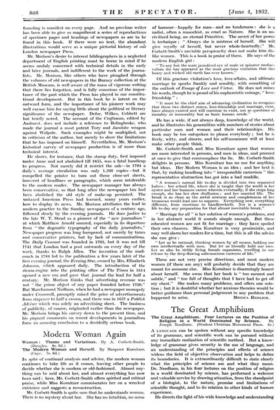The Great Amphibium
The Great Amphibium. Four Lectures on the Position of Religion in a World Dominated by Science. By Joseph Needham. (Student Christian Movement Press. as.) A LANGUAGE can be spoken without any specific knowledge of its grammar, and scientific work can be pursued without any immediate realization of scientific method. But a know- ledge of grammar gives security in the use of language, and an understanding of the principles and effects of science widens the field of objective observation and helps to define its boundaries. It is extraordinarily difficult to state clearly what the principles of science are and what they mean. Dr. Needham, in his four lectures on the position of religion in a world dominated by science, has performed a welcome and valuable service by drawing attention, from the standpoint of a biologist, to the nature, promise and limitations of scientific thought, and to its relation to other kinds of human experience.
He directs the light of his wide knowledge and understanding
upon the opposition between science and religion. Science gives power, but being ethically neutral it does not tell how the power it has given is to be applied. It demands that all its problems should be approached in the same spirit, without reference to good or evil ; so that in its view anti- toxic sera, for example, are no better and no worse a discovery than are poison gases. Because of this, scientists as such have no right to administrate human societies for, writes Dr. Needham, " the basis of any administration must be a set of ethical judgements, a set of views about what is wrong and what is right." What the scientists can provide to take the place of ethical judgements—an estimate of an action on the basis of the " material injury or benefit done to the society of individuals within which the action takes place," is, he considers, no adequate substitute, although it is one that will inevitably become more prevalent with the spread of science. Traditional morality must be adversely affected by the more general acceptance of the scientific point of view, and although this view implies a diminished importance of individuals as such, science will be able to confer peace of mind on all who accept its sway, by removing to a large extent the onus of personal responsibility.
Dr. Needham believes that organized religion is doomed in a world that appears to be developing in this scientific way. He nevertheless would have people " participate actively in religious rites, and maintain firmly the fundamental validity of the religious experience as a characteristic activity of the human spirit." He would have them do this in order to soften the possible tyranny of the new scientific experience that is gradually replacing religion. He suggests that religious ritual is justified by religious feeling, and that religion, if it is valid, is valid in itself. It needs and can get no help from science. Apologists attempt only in vain to bring the findings of modern science into line with religious beliefs. For example, they cannot restore the free will taken from man by the crude scientific opinions of the late nineteenth and early twentieth centuries by postulating that the physical indeterminism believed in by the modern physicists implies psychological indeterminism, for the least reason that physicists themselves may soon be believing in something different.
After all, from the point of view of religion the reality of science is a restricted reality, one confined to what is plainly communicable. In Dr. Needham's view it is the " Creator's most ill-advised piece of irony that just those matters which are least important should be most easily and perfectly communicable." There are many who would oppose his view of the relative value of scientific knowledge, and who will dispute certain other issues which are raised. But few will deny his conclusions that the science, the philosophy and the religion of to-day must each follow its own path, and that the " best man is the man who is friendly to, even if he cannot enter into, each one of the great forms of human





































 Previous page
Previous page